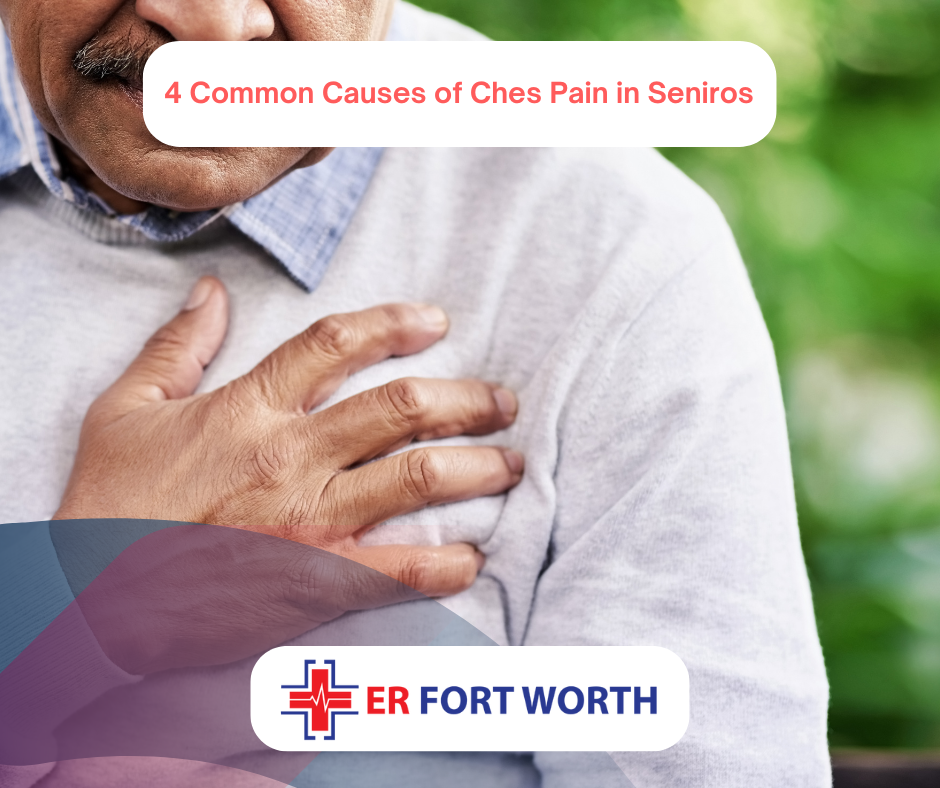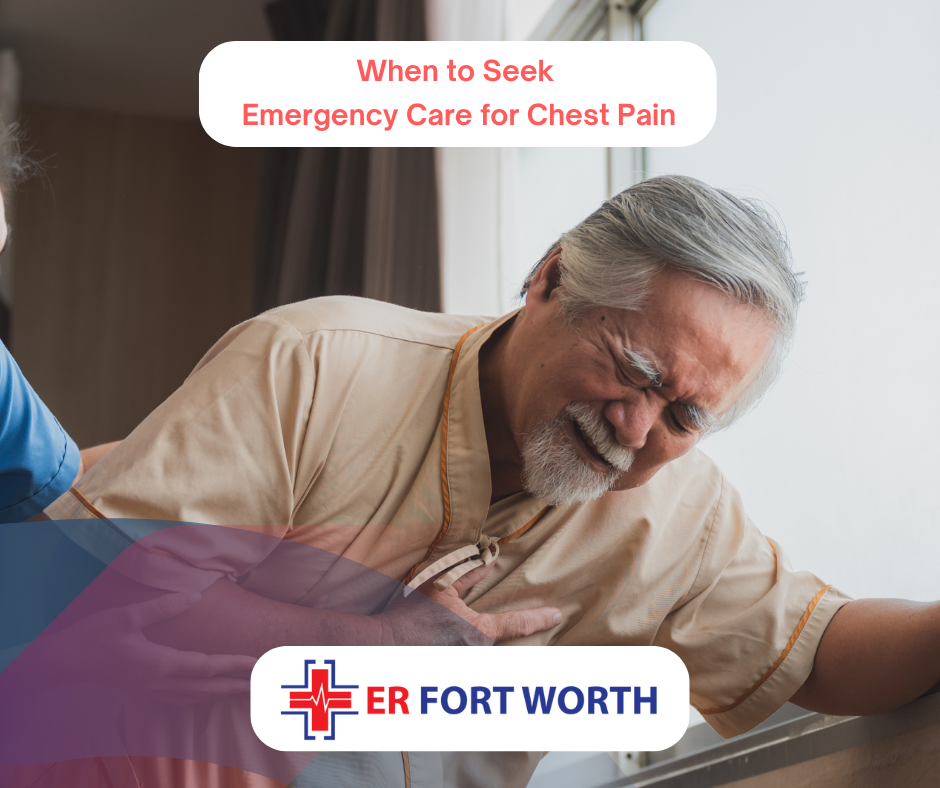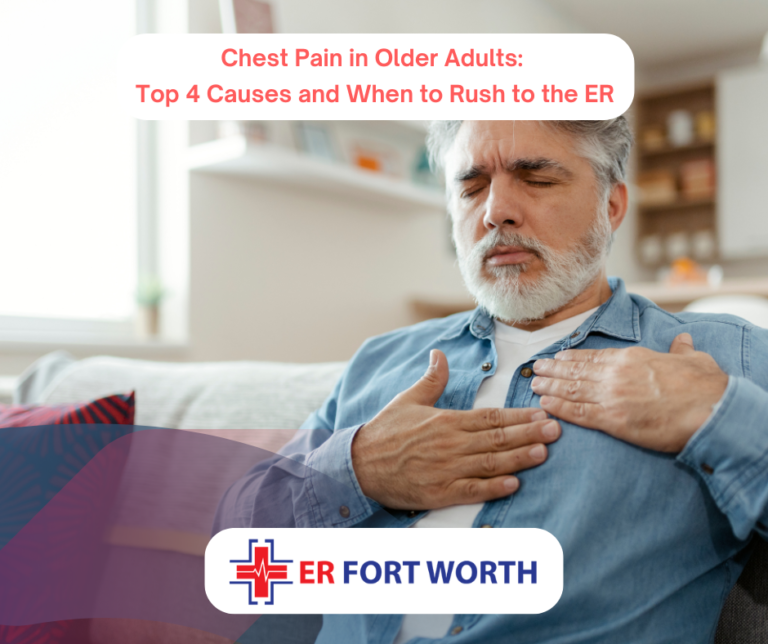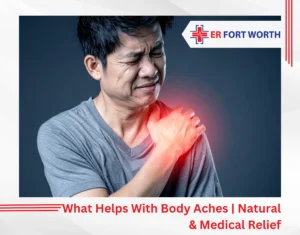A sudden tightness in the chest can be unsettling for any older adult. While not every twinge signals danger, distinguishing between passing discomfort and a potential emergency is crucial for seniors and their caregivers.
Chest pain in older adults could arise from various sources, ranging from cardiovascular issues to musculoskeletal strains. Understanding these common causes is the first step in assessing the severity of the situation.
This guide covers the frequent culprits behind chest pain in older adults or in seniors, explores key warning signs, and when to seek medical attention.
Comprehensive Guide to Chest Pain
4 Common Causes of Chest Pain in Seniors

Cardiovascular Diseases
Heart-related issues top the list for causes of chest pain in older adults. The American Heart Association reports that chest pain in older adults is a primary indicator of heart disease in adults over 65, regardless of gender. However, chest pain in elderly women offers a unique challenge as it often occurs without a clear coronary artery blockage, making diagnosis more complicated.
Among the cardiovascular problems in elderly patients, the following three conditions stands out:
- Angina: This occurs when the heart muscle doesn’t get enough oxygen-rich blood. Seniors usually describe it as a squeezing or pressure in the chest, often triggered by physical activity or stress.
- Heart Attack: A condition where blood flow to a part of the heart is blocked. Symptoms include severe chest pain, shortness of breath, sweating, and nausea. This is a medical emergency that requires immediate attention.
- Aortic Dissection: This serious condition involves a tear in the inner layer of the aorta, causing severe chest pain that radiates to the back. It requires prompt surgical intervention.
Pulmonary Issues
While heart conditions are common culprits, lung-related issues can also trigger chest pain in seniors. These respiratory conditions often mimic heart-related symptoms which makes accurate diagnosis crucial. Here are three main pulmonary issues that can cause chest pain in older adults.
- Pulmonary Embolism: This life-threatening condition occurs when a blood clot blocks a lung artery. Patients may experience sharp chest pain and difficulty breathing.
- Pneumonia: A lung infection that’s particularly concerning for seniors due to their often weakened immune system. Its symptoms include chest pain, fever, and a persistent cough. It may sometimes occur without fever, so vigilance is important.
- Chronic Obstructive Pulmonary Disease (COPD): COPD is an umbrella term that includes chronic bronchitis and emphysema. It’s common in the elderly, especially those with a history of smoking. COPD can cause chest tightness that worsens with time.
Gastrointestinal Problems
When it comes to non-cardiac causes of chest pain in older adults, gastrointestinal issues top the list. These digestive problems often masquerade as cardiac issues and account for a significant portion of chest pain cases in seniors. Prevalent gastrointestinal conditions include:
- Gastroesophageal Reflux Disease (GERD): This common cause of chest pain occurs when stomach acid flows back into the esophagus. GERD can lead to heartburn that mimics angina, especially when lying down or after meals.
- Esophageal Spasm: This condition involves a sudden, painful contraction of the muscles in the esophagus. These spasms can cause intense chest pain often mistaken for a heart attack.
Musculoskeletal Strains
Musculoskeletal strains don’t often dominate discussions on chest pain, but they can cause alarming pain that may be mistaken for more severe serious issues. Two common musculoskeletal causes of chest pain include:
- Costochondritis: This condition involves inflammation of the cartilage that connects the ribs to the breastbone, resulting in sharp chest pain. Costochondritis can be particularly concerning among seniors as its symptoms can resemble those of heart attack.
- Muscle Strain: As we age, our muscles become more susceptible to injury. Overuse or sudden movements can lead to strains in the chest muscles, causing pain that intensifies with motion.
While musculoskeletal strains are less serious than cardiac issues, they can still significantly impact quality of life and daily activities.
When to Seek Emergency Care for Chest Pain

Chest pain in older adults should never be ignored. Knowing when to seek immediate medical attention can be life-saving. Call emergency services or visit the nearest ER immediately if you or your loved one experiences any of these symptoms:
- Sudden and severe chest pain
- Pain that radiates to the arm, neck, jaw, or back
- Difficulty breathing or shortness of breath
- Cold sweats
- Lightheadedness or dizziness
- Heart palpitations or rapid heartbeat
- Chest pain that worsens with activity or exertion
- Persistent or recurrent chest discomfort
Remember, when it comes to chest pain in older adults, it’s always better to err on the side of caution. Prompt medical attention can make a crucial difference in outcomes.
Treatment of Chest Pain in the Elderly
Chest pain in older adults management for seniors starts with a thorough medical evaluation to pinpoint the root cause. Here are some common approaches for elderly chest pain treatment:
Medications
- Cardiac-related pain: Nitroglycerin, beta blockers, and ACE inhibitors
- Pain relief: Acetaminophen or ibuprofen
- Blood clots prevention: Anticoagulants
Procedures
- Angioplasty: A minimally invasive procedure to open blocked arteries
- Cardiac catheterization: Used to diagnose and treat heart conditions
- Surgery: In severe cases, surgery repairs or replaces damaged heart structures
- Respiratory treatments: Oxygen therapy manages breathing difficulties
Lifestyle Changes
- Quit smoking: Reduces the risk of cardiac events
- Regular, gentle exercise: Improves heart health and helps maintain a healthy weight
- Healthy diet: Supports overall cardiovascular well-being
- Stress management: Techniques like meditation and deep breathing can reduce anxiety-related chest pain
Our board-certified physicians at ER of Fort Worth may combine these approaches to create a comprehensive treatment plan tailored to your specific needs. This approach not only manages your chest pain but also enhances your overall health and quality of life.
Request an Appointment for Chest Pain Now
FAQs
How to relieve a tight chest?
To relieve a tight chest, try taking slow, deep breaths, inhaling through your nose and exhaling through your mouth. Engage in relaxation techniques like shoulder rolls, chest stretches, and gentle massage or apply a warm compress to the area.
How do you know if chest pain is not heart related?
Your chest pain is likely not heart-related if it’s localized to one side and feels sharp or stabbing. If the pain typically worsens with movement or deep breathing and is accompanied by symptoms like fever, chills, or difficulty swallowing, it may point to a non-cardiac cause. However, always err on the side of caution and consult a healthcare professional.
How do I stop getting chest pain?
To stop getting chest pain, maintain a healthy lifestyle by engaging in regular exercise and eating a balanced diet rich in fruits, vegetables, and whole grains.
Quitting smoking, limiting alcohol consumption, and managing underlying medical conditions like high blood pressure, high cholesterol, and diabetes can also minimize chest pain episodes.




